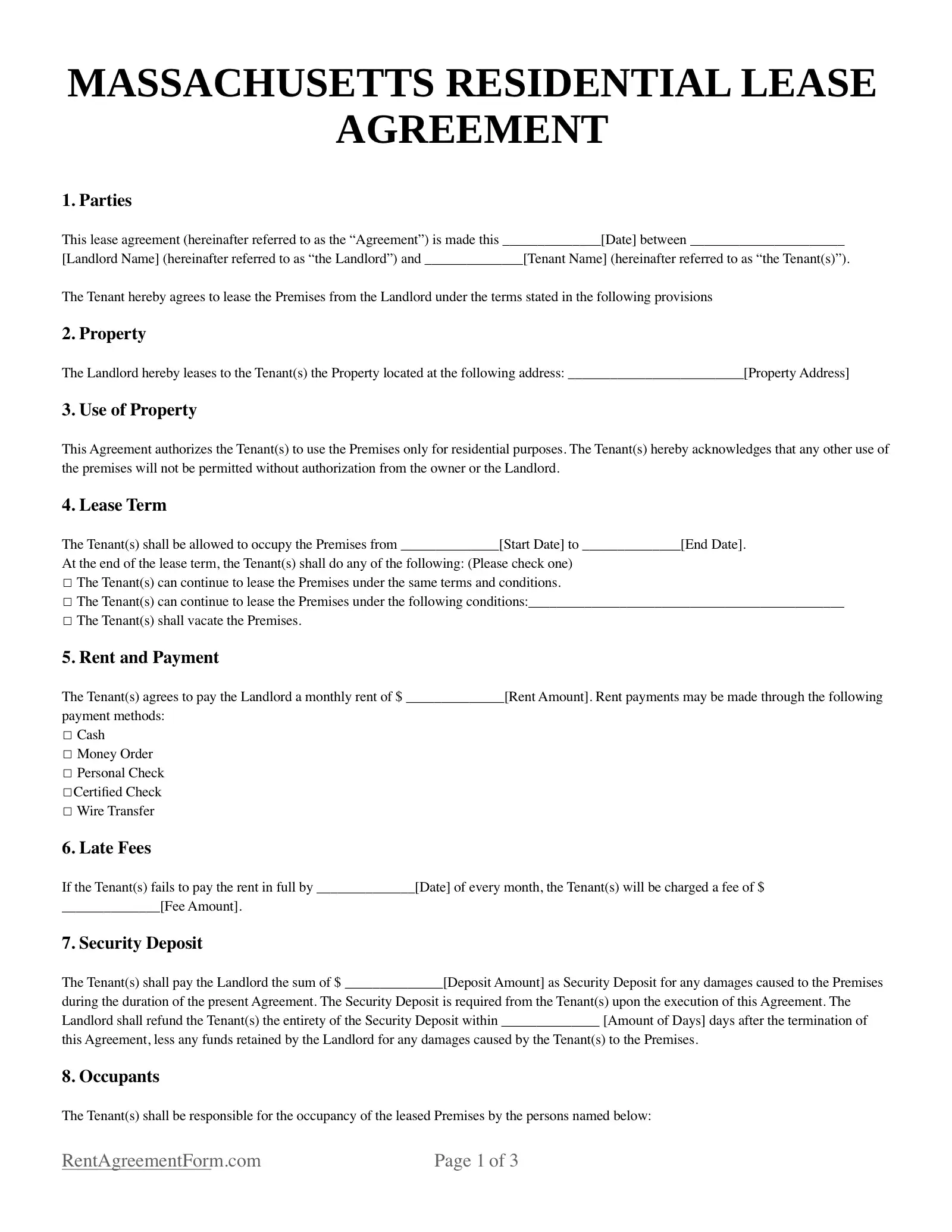Massachusetts Residential Lease Agreement Form
A Massachusetts Residential Lease Agreement Form is a binding contract between a landlord and tenant that governs the use of a residential apartment or house for rent. The agreement should adhere to the provisions of Massachusetts General Laws Part II on Real and Personal Property and Domestic Relations.
A Massachusetts rental application form precedes the lease agreement form. Upon approval of the tenant's application, the landlord and tenant can start talking about the lease. The lease agreement form contains the terms and conditions of the tenant’s use of the property. It provides a brief description of the property and has the names and signatures of the landlord and tenant.
The standard form should also list the names of all occupants, including pets. It details the responsibilities of the two parties. The landlord should ensure that the tenant has a safe and livable home while the tenant should pay rent on time and take care of the property. The lease also includes required landlord disclosures based on Massachusetts laws.

Required Disclosures
- Lead-Based Paint Disclosure - It is the landlords’ responsibility to disclose if the real estate for rent uses lead-based paint. This is because lead-based paint was common among properties built before 1978 and was later discovered dangerous to human health. Landlords are thus required to provide tenants with educational materials about its hazards. These materials must be approved by the U.S. Environmental Protection Agency (EPA) (Lead-Based Paint Disclosure Rule (Section 1018 of Title X)).
- Owner’s Name and Address - The landlord should share with the tenant the names of the property owner and property manager. Moreover, the tenant should be made aware of other people who are authorized to enter the rental building.
- Insurance Disclosure - If the tenant inquires about property insurance, the landlord has 15 days to provide the name of the building’s insurance company. In addition, the landlord must also disclose the details of coverage in case of fire and the beneficiary of the insurance policy (Massachusetts General Laws, Part I, Title XXII, Chapter 175, Section 99.
Rent Grace Period
Massachusetts has a long rent grace period. Tenants have up to 30 days after the due date to pay rent before landlords charge a late fee. If the tenant still hasn’t paid rent after the grace period, the landlord can send a 14-day notice. During the two-week period, the tenant can either pay rent or move out. If not, they may face an eviction lawsuit (Massachusetts General Laws, Part II, Title I, Chapter 186, Section 15B).
Security Deposits
Landlords can collect a security deposit in Massachusetts equivalent to one month’s rent. It has to be deposited in an interest-bearing bank account. After receiving and depositing the security deposit, the landlord has to give the tenant a simple receipt that includes the name of the bank, account number, and a statement that says the tenant is entitled to the interest from the deposit.
If the tenant has lived in the rental for at least a year, they can earn around 5% interest from the security deposit. This should be turned over to the tenant every year during the tenancy anniversary.
When the tenancy is terminated, the landlord has 30 days to return the security deposit or part of it. The landlord can withhold part of the amount if there is damage to the property or the tenant fails to pay rent. The landlord should provide the tenant with a detailed list of damage and necessary repairs within 30 days from the end of the lease (Massachusetts General Laws, Part II, Title I, Chapter 186, Section 15B).